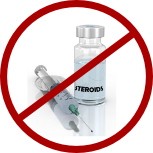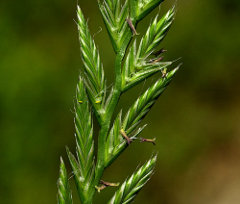Just as with humans, pets can be allergic to a number of things. They can have inhalant allergies to dust, dust mites, trees, weeds, molds and pollens. Reactions include sneezing, coughing, scratching, runny eyes, or runny nose.  They can also be allergic to certain things that they touch, which is called contact dermatitis. These allergens can include plastic, cotton, wool, nylon, foam, rubber or any toxic substance.
They can also be allergic to certain things that they touch, which is called contact dermatitis. These allergens can include plastic, cotton, wool, nylon, foam, rubber or any toxic substance.
The most common problems are inflamed reactions to flea bites and food allergies caused by improper nutrition. Many holistic minded veterinarians believe that most of the ailments they see are related to food allergies. A first step in remediating allergic reactions should be to change the diet and get rid of obvious allergens. If the reaction is sudden and not on-going, look for new irritants such as a cleaner used around the house, exposure to fiberglass, or some sort of chem ical spill. Symptoms of flea bite allergies include scratching, licking, biting, pulling at the skin, lesions, rashes, bumps, hair loss, or hot spots. This condition can be seasonal.
ical spill. Symptoms of flea bite allergies include scratching, licking, biting, pulling at the skin, lesions, rashes, bumps, hair loss, or hot spots. This condition can be seasonal.
Pets can be allergic to just about any ingredient in their food. The most common food allergies are corn and wheat. Most commercial pet foods are too high in carbohydrates because carbohydrate sources are cheaper than meat and are often used as fillers. In addition, the grains used by commercial pet food  companies are often the remains that are unfit for human consumption. They are regularly rotten, moldy, or rancid. Overuse of such grains has caused many pets to develop intolerances. Symptoms include rubbing, scratching, itching, sneezing, coughing, hair loss, pimples, rashes, recurrent diarrhea or vomiting, and red or inflamed patches. Allergic reactions can lead to other conditions such as ear infections, sinusitis, asthma, fatigue, loss of appetite, lick granulomas, and interdigital dermatitis (see Nail and Paw Problems).
companies are often the remains that are unfit for human consumption. They are regularly rotten, moldy, or rancid. Overuse of such grains has caused many pets to develop intolerances. Symptoms include rubbing, scratching, itching, sneezing, coughing, hair loss, pimples, rashes, recurrent diarrhea or vomiting, and red or inflamed patches. Allergic reactions can lead to other conditions such as ear infections, sinusitis, asthma, fatigue, loss of appetite, lick granulomas, and interdigital dermatitis (see Nail and Paw Problems). 
Steroids such as cortisone are often prescribed, but these drugs don’t treat the condition, they only mask the symptoms. Because of this, corticosteroids are often prescribed repeatedly, as a life-long plan. And the overuse of steroidal drugs can have crippling effects.
Common signs of allergies include:
- Itching and chewing

- Redness
- Hair loss
- Hot spots
- Skin eruptions
- Eczema
- Inflamed ears
- Sneezing
- Watery eyes
- Lick granulomas
Allergic reactions can exacerbate other conditions such as:
- Ear infections
- Sinusitis
- Asthma
- Fatigue
- Loss of appetite
Herbal and Naturopathic Help
For any allergic condition, it’s imperative that you feed your pet a natural diet made from simple, wholesome, raw foods. This is, by far, the most important factor.
 Pinpointing a specific food allergy can be difficult. You can get tests done at your veterinarian’s office, but these tests tend to be unreliable. The best way to diagnose a food allergy is to do elimination tests. This requires time and patience. During food elimination tests, your dog or cat is only allowed to eat a special, simple diet. After several weeks, one type of food will be introduced to the diet. If no symptoms occur in response to the addition of this food, you will know that your pet is not allergic to that type of food. More foods are added one at a time, and symptoms are checked after each addition. Food elimination trials can take months, and your pet cannot receive any treats or extras during that time.
Pinpointing a specific food allergy can be difficult. You can get tests done at your veterinarian’s office, but these tests tend to be unreliable. The best way to diagnose a food allergy is to do elimination tests. This requires time and patience. During food elimination tests, your dog or cat is only allowed to eat a special, simple diet. After several weeks, one type of food will be introduced to the diet. If no symptoms occur in response to the addition of this food, you will know that your pet is not allergic to that type of food. More foods are added one at a time, and symptoms are checked after each addition. Food elimination trials can take months, and your pet cannot receive any treats or extras during that time.
 If an environmental allergen is the culprit, you may never know what the allergen is. But there are steps you can take to try to find out. Do elimination tests on substances around the house – rubber toys, foam pads, and synthetic collars, for example. If you think the allergen may be outdoors, wipe your pet down with a warm and damp cloth after returning home. It’s also important to keep heating and air conditioning vents clean to keep the mold concentration low in the house. Yearly professional cleaning of heat and air conditioning ducts is recommended.
If an environmental allergen is the culprit, you may never know what the allergen is. But there are steps you can take to try to find out. Do elimination tests on substances around the house – rubber toys, foam pads, and synthetic collars, for example. If you think the allergen may be outdoors, wipe your pet down with a warm and damp cloth after returning home. It’s also important to keep heating and air conditioning vents clean to keep the mold concentration low in the house. Yearly professional cleaning of heat and air conditioning ducts is recommended.
Also, giving your pet a multivitamin/mineral supplement formulated for dogs or cats can help, along with these supplements. Each is per ten pounds of body weight.
- Vitamin C – 200 mg
- Vitaming E – 80 mg
- Vitamin B Complex with 10 mg of B12
- Selenium – 10 mcg (micrograms, not milligrams)
- Zinc – 5 mg

- Cold-pressed sunflower or sesame oil – 1 tbsp
- Apple cider vinegar
Water is another very important factor to consider. Make sure your pet’s water is from an uncontaminated source and you use a glass, ceramic, or stainless steel dish with no toxic paints or shellacs.
Seeing that your pet gets adequate exercise, with fresh air and natural light, also helps. Be aware, when your pet is outside, of the potential for toxicities in the environment. The park, for example, may seem like a great place to exercise and get fresh air,  but there may be pesticisdes sprayed all over that lush, green, weed-free grass. Dogs and cats are more susceptible to this than we are because they are so close to the ground, and they seep up the particles with their feet and ever-sniffing noses. To find out if a park has been sprayed recently can take some sleuthing. A good place to start is with a call to the local Parks and Recreation department.
but there may be pesticisdes sprayed all over that lush, green, weed-free grass. Dogs and cats are more susceptible to this than we are because they are so close to the ground, and they seep up the particles with their feet and ever-sniffing noses. To find out if a park has been sprayed recently can take some sleuthing. A good place to start is with a call to the local Parks and Recreation department.
Medications and vaccinations can also be contributing factors. Don’t suddenly discontinue prescriptions. Do talk to a holistic veterinarian.
If your pet is suffering from flea and other bite allergies, see the section on parasites.
To help with itchy skin while the body is in recovery, occasional oatmeal baths are helpful. Don’t use a pet shampoo, though. This could make the condition worse. For topical relief, try jojoba oil, aloe vera, or essential oil of lavender. The lavender oil is thought to act as an antiseptic, a soothing agent, and a pest repellent.
lavender. The lavender oil is thought to act as an antiseptic, a soothing agent, and a pest repellent.
Many holistic veterinarians recommend starting out with a fast. See Fasting for more information.
Recovering from allergies is not a quick fix. You probably won’t see immediate results. If you find yourself getting impatient, think of the healthy life you want your pet to be living a year from now.
Homeopathy
There are too many types of allergies and too many possible reasons for the symptoms. Homeopathy is specific, so an accurate diagnosis is important. Take careful note of your pet’s symptoms and consult with a naturopathic or homeopathic veterinarian.